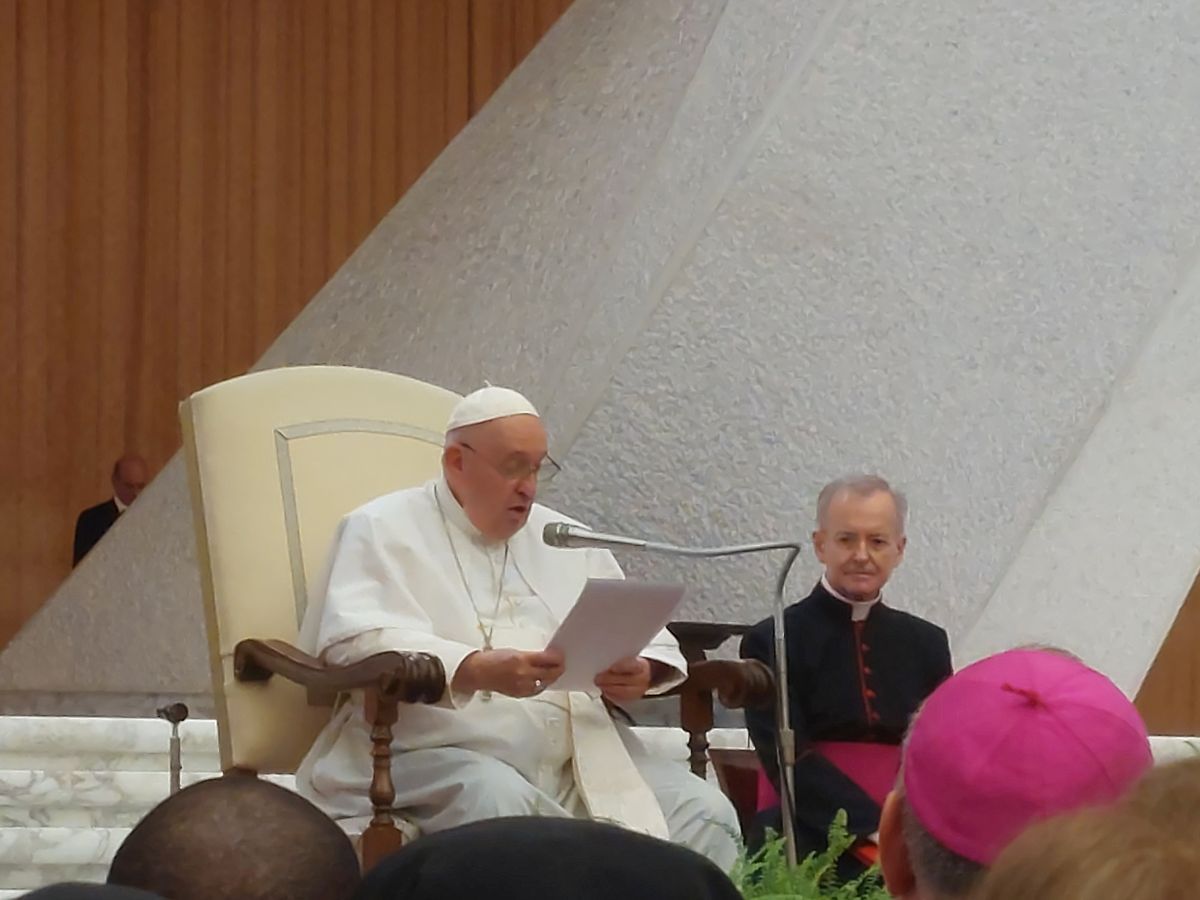
The passing of Pope Francis was marked by a Mass at the Metropolitan Cathedral as Archbishop Malcolm McMahon remembered a pontiff who ‘radiated peace’.
By Simon Hart
With the passing of Pope Francis, the world has lost a man who ‘emanated the peace of Christ’. That was the message from Archbishop Malcolm McMahon as he remembered the ‘self-effacing’ Argentinian pontiff, who passed away on Easter Monday, 21 April, aged 88.
Pope Francis had made a final appearance on the balcony overlooking St Peter’s Square in Rome only the day before, Easter Sunday, when he called for peace in Gaza and elsewhere in the Middle East and in Ukraine too.
And a man who demanded peace, radiated it according to Archbishop Malcolm: ‘He said to us bishops when we were visiting in 2018 that after he was elected Pope, he felt a great peace come upon him and it had stayed with him ever since.’
It was Archbishop Malcolm who led the Mass for the repose of the soul of Pope Francis at the Metropolitan Cathedral of the Christ the King on the evening of 22 April.
Around 1,500 people were present, including other faith leaders. Yet amid the sadness, Archbishop Malcolm noted that the pope’s last words to the public had been ‘Happy Easter’ and he had now ‘gone to join the resurrected Christ’.
A book of condolence was opened at the cathedral and there were Masses for Pope Francis said in parishes across the archdiocese. At the Co-cathedral of St Mary of the Isle, Isle of Man, a Mass for the repose of the pontiff’s soul was celebrated on 25 April, the day before his Requiem Mass at St Peter’s and burial at the Basilica of Saint Mary Major.
The Buenos Aires-born Jorge Mario Bergoglio was elected pope in March 2013, becoming the first South American and first Jesuit pontiff.
‘He was very unassuming,’ recalled Archbishop Malcolm. ‘He didn’t wear the trappings of power; he just wore his white cassock. He simplified things. He was a happy man in himself, and he loved to share a laugh.’
Indeed, more than once when meeting Archbishop Malcolm, Pope Francis exclaimed: ’Ah, Liverpool, the Napoli of England!’ – a reference to both cities’ passion for football.
Reflecting on Pope Francis’ legacy, Archbishop Malcolm cited; ‘the way he introduced synodality into the Church which is essentially about listening to each other.’
He added: ‘In listening to each other in that special way he called “conversations in the spirit”, we come to places of reconciliation and agreement.
‘What he was keen on was going to the edges of the world,reaching out to people of other religions, people with no religions.
‘What mattered to him were people, people who had beencreated by God, and that’s all of us. He saw in that a common humanity.
‘Also, he saw that the most important thing was mercy and if you have a Church that’s merciful, a lot of things that make people feel excluded become less significant so we can become a more welcoming Church.’
‘He listened with humility’
Archbishop-elect John Sherrington similarly witnessed Pope Francis’ genuine interest in others and what they had to say.
He related: ‘I remember the bishops’ visit to Rome in 2018 when we sat with Pope Francis in a circle, and he invited our questions and thoughts about the Church’s mission today in England and Wales. He listened with humility and encouraged us to be strong in preaching the hope of Jesus Christ risen from the dead.’
The Archbishop-elect also recalled Pope Francis’ ‘warmth, joy, tender mercy, kindness, clear voice for truth, and strong love for the weakest and poorest of God's people. These thoughts and feelings echo now in my heart as I grieve for Pope Francis.
‘On Holy Thursday, he had visited prisoners at Rebibbia Prison in Rome; on Easter Sunday he wanted to share the hope of Christ's Resurrection with the pilgrims at St Peter's. These actions showed his love to the end as a Good Shepherd who always wanted to be close to all his brothers and sisters.’
For Bishop Thomas Neylon, Pope Francis’ legacy includes the ‘very practical ways in which we can witness to Christ in the world in which we live.’
Citing ‘Laudato Si’, his 2015 encyclical on the environment, Bishop Neylon added: ‘He helped us see the connection between human life, economic life and ecological life – the planet we live on and the way we conduct ourselves as people and what we do with the wealth that’s created.’
Finally, Bishop Emeritus Tom Williams remembered his ‘ability to see the presence of Christ in others, particularly children’ and gave the example of the last day of an international meeting of healthcare workers in Rome.
In a hall filled with ‘over 6,000 children with autism and their families’, he saw Pope Francis swamped by youngsters yet ‘smiling and laughing with them the whole time.’
In short, a man of joy as well as peace.
As seen in May's Catholic Pic. You can read it online here.